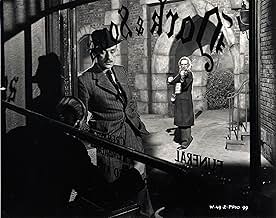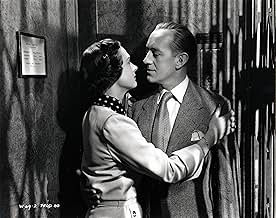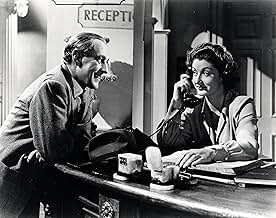ÉVALUATION IMDb
7,3/10
2,3 k
MA NOTE
Ajouter une intrigue dans votre langueWhen a lonely, unappreciated farm-equipment salesman discovers he has only a few weeks to live, he withdraws his savings for a final holiday at a "posh" resort.When a lonely, unappreciated farm-equipment salesman discovers he has only a few weeks to live, he withdraws his savings for a final holiday at a "posh" resort.When a lonely, unappreciated farm-equipment salesman discovers he has only a few weeks to live, he withdraws his savings for a final holiday at a "posh" resort.
Grégoire Aslan
- Gambini
- (as Coco Aslan)
Eveline Kirkwood-Hackett
- Miss Hatfield
- (as Mme. Kirkwood-Hackett)
Avis en vedette
What makes a film good? In this case it's the writing that first draws you in. Writer and co-producer J.B.Priestly (The Old Dark House '32 ~ An Inspector Calls '54) has a way with words that compels the viewer to want to know more about his characters. With wit and a sense of mystery, he surrounds us with multi layered groups of people that are mostly drawn together by chance. In 'Last Holiday' the cruel hand of fate brings us face to face with ultimate irony.
It's filled with marvelous situations, at first upsetting, then wryly funny, leading to an unexpected ending that invites us to examine the way we not only relate to others, but how we treat them. Priestly is examining the bias that all too often accompanies class consciousness. The cast is exquisitely diverse, everyone from bit players to mains, deliver sterling performances under direction from Henry Cass (Glass Mountain '49). Welsh born Cinematographer: Ray Elton (Quartet '48) with his strong grounding in documentaries, brings a realistic look to the fine work of Scottish art director Duncan Sutherland (San Demetrio London '43 ~ The Human Monster '49).
I found the music score by Romanian born composer Francis Chargrin surprisingly melodic for a 50s film of this type. Its thoughtful main theme is equally likable as his later 'The Beachomber' in '54. You might also remember Chargrin for his 'Colditz Story' '55, and 'Grey Friars Bobby' '61. Those who enjoy the always professional performances of Alec Guinness will enjoy his generally dour role in this off-beat mini classic.
My viewing was hindered by Australian TV broadcaster Gem's, persistence in supering 'pop-up' adds for up-coming shows, and their ridiculous LARGE lolly 'Pink' station ID. At least this time they screened the full film after inadvertently leaving out a reel in an earlier screening! Sure wish this broadcaster would treat their viewers, and the films they run with far more respect!
It's filled with marvelous situations, at first upsetting, then wryly funny, leading to an unexpected ending that invites us to examine the way we not only relate to others, but how we treat them. Priestly is examining the bias that all too often accompanies class consciousness. The cast is exquisitely diverse, everyone from bit players to mains, deliver sterling performances under direction from Henry Cass (Glass Mountain '49). Welsh born Cinematographer: Ray Elton (Quartet '48) with his strong grounding in documentaries, brings a realistic look to the fine work of Scottish art director Duncan Sutherland (San Demetrio London '43 ~ The Human Monster '49).
I found the music score by Romanian born composer Francis Chargrin surprisingly melodic for a 50s film of this type. Its thoughtful main theme is equally likable as his later 'The Beachomber' in '54. You might also remember Chargrin for his 'Colditz Story' '55, and 'Grey Friars Bobby' '61. Those who enjoy the always professional performances of Alec Guinness will enjoy his generally dour role in this off-beat mini classic.
My viewing was hindered by Australian TV broadcaster Gem's, persistence in supering 'pop-up' adds for up-coming shows, and their ridiculous LARGE lolly 'Pink' station ID. At least this time they screened the full film after inadvertently leaving out a reel in an earlier screening! Sure wish this broadcaster would treat their viewers, and the films they run with far more respect!
Last Holiday contains the first really dramatic performance by Alec Guinness. It's also the first time he's carrying a film as per the billing on the strength of his abilities. It's one beautiful performance in a picture with a universal message.
Alec Guinness plays your British every man who having no wife, no family, and no close relatives is likely to be remembered by very few when he passes on and then for a short time. He's given the news that the grim reaper is close, it might be a matter of a few weeks or a few months. What to do but go out and just enjoy things while you can.
So he packs off and stays at the small but posh Regal Hotel, a seaside resort much prized by the British vacationers. And he has some phenomenal luck there, winning huge poker pots, longshot horse racing bets coming in. He even finds some love with hotel housekeeping manager Kay Walsh. But how to tell the new friends he's made what is in store for him?
J.B. Priestley wrote the original script and in my opinion should have been a candidate for all kinds of awards. It is direct and simple and never maudlin. Guinness got the character down perfectly. And the ending is truly ironical.
Which must have pleased and singed director Henry Cass a bit. Back in the 30s when Guinness was starting in the profession he tried out for a stage production directed by Cass who told him in no uncertain terms he was a no talent bum. This comes from a biography of Guinness. Kind of like Phil Rizzuto who was told he'd never be a ballplayer by Casey Stengel and then having him as his manager on the Yankees after becoming an All Star.
One should watch Last Holiday together with Grand Hotel and note some of the similarities and the differences with Lionel Barrymore and Alec Guinness both portraying men under a death sentence.
I think the message is the same, you never know when you're checking out so live accordingly.
Alec Guinness plays your British every man who having no wife, no family, and no close relatives is likely to be remembered by very few when he passes on and then for a short time. He's given the news that the grim reaper is close, it might be a matter of a few weeks or a few months. What to do but go out and just enjoy things while you can.
So he packs off and stays at the small but posh Regal Hotel, a seaside resort much prized by the British vacationers. And he has some phenomenal luck there, winning huge poker pots, longshot horse racing bets coming in. He even finds some love with hotel housekeeping manager Kay Walsh. But how to tell the new friends he's made what is in store for him?
J.B. Priestley wrote the original script and in my opinion should have been a candidate for all kinds of awards. It is direct and simple and never maudlin. Guinness got the character down perfectly. And the ending is truly ironical.
Which must have pleased and singed director Henry Cass a bit. Back in the 30s when Guinness was starting in the profession he tried out for a stage production directed by Cass who told him in no uncertain terms he was a no talent bum. This comes from a biography of Guinness. Kind of like Phil Rizzuto who was told he'd never be a ballplayer by Casey Stengel and then having him as his manager on the Yankees after becoming an All Star.
One should watch Last Holiday together with Grand Hotel and note some of the similarities and the differences with Lionel Barrymore and Alec Guinness both portraying men under a death sentence.
I think the message is the same, you never know when you're checking out so live accordingly.
10albee-2
A poignant, bitter-sweet comedy that drives home its points in clever, subtle ways. Surprisingly, for a film 50 years old, the acting, direction and story line keep it fresh and timely. Alec Guiness "made his bones" in excellent early films such as this and gave us a sneak preview of the greatness that was to come.
The central character (Guiness) is "a modest unassuming salesman of agricultural implements" (Wikipedia). A respectable almost classless person whose unassuming manner, unglamorous job and modest salary have limited his social circle. For the first (and last) time circumstances allow him to spend freely and, for want of any other idea, stay a few weeks at a very upmarket seaside hotel. Its clientele have only one thing in common: either possessing wealth or using the opportunity to accumulate it. Some are rich and lack class, others have power and status as well as wealth. The Guinness character for the first time has an opportunity to network with important people.
Guinness in a way reprises his role in The Man in the White Suit - a thoroughly honest man innocent in the ways of the world whose modest manner and appearance belies his inventive genius. Yet is remarkably unchanged by success and continues to treat both high and low equally - and cause a surprising degree of unintended upset.
A good story with excellent cast, it is a less demanding part for the chameleon genius of Guinness. As usual with Priestley very well crafted story-telling. However the film dates from 1950 - 5 years after WW2 when people were looking to a better future and trying to put grief behind them. During WW2, Priestley had been the nation's uncle, providing not false comfort but a steadying presence putting the worlds events into a assimilable form for the average person. With the end of the war, the public's need for Priestley (much as their need for Churchill) ended. The film's sour end seems to have no point other than to say just when things are looking up and people at their most cheerful and optimistic, everything can be be dashed to the ground in an instant.
Guinness in a way reprises his role in The Man in the White Suit - a thoroughly honest man innocent in the ways of the world whose modest manner and appearance belies his inventive genius. Yet is remarkably unchanged by success and continues to treat both high and low equally - and cause a surprising degree of unintended upset.
A good story with excellent cast, it is a less demanding part for the chameleon genius of Guinness. As usual with Priestley very well crafted story-telling. However the film dates from 1950 - 5 years after WW2 when people were looking to a better future and trying to put grief behind them. During WW2, Priestley had been the nation's uncle, providing not false comfort but a steadying presence putting the worlds events into a assimilable form for the average person. With the end of the war, the public's need for Priestley (much as their need for Churchill) ended. The film's sour end seems to have no point other than to say just when things are looking up and people at their most cheerful and optimistic, everything can be be dashed to the ground in an instant.
This film happen to be at the top of my all time favourites.
I always thought that Alec and Kay had a sparkle when acting together..."Oliver Twist";"Last Holiday";"The Horses Mouth";"Tunes of Glory"...I did not mention "Scrooge" because they did not appear together in any scene.
It is interesting to note that if two actors have a close rapport then their performance reflects this very well.
In "Tunes of Glory" a number of scenes were cut that had both actors in it. I remember one scene Still had Jock and Mary in bed together. Maybe it was deemed unnecessary and the censor would have made it an "A" movie instead of a "U".
I would greatly appreciate any comments you may have concerning these two actors as I am writing a book about British Film Actresses and a large section will be devoted to Kay Walsh.
Thank you,
MCG
I always thought that Alec and Kay had a sparkle when acting together..."Oliver Twist";"Last Holiday";"The Horses Mouth";"Tunes of Glory"...I did not mention "Scrooge" because they did not appear together in any scene.
It is interesting to note that if two actors have a close rapport then their performance reflects this very well.
In "Tunes of Glory" a number of scenes were cut that had both actors in it. I remember one scene Still had Jock and Mary in bed together. Maybe it was deemed unnecessary and the censor would have made it an "A" movie instead of a "U".
I would greatly appreciate any comments you may have concerning these two actors as I am writing a book about British Film Actresses and a large section will be devoted to Kay Walsh.
Thank you,
MCG
Le saviez-vous
- AnecdotesThe film includes cast members who cropped up in various Alec Guinness films. Amongst them are Sidney James, Ernest Thesiger and Kay Walsh.
- GaffesBird states that he made about 9 Pounds a week. This is about 470 Pounds per annum. When his manager is trying to get him to stay he first offers to raise his salary to 400 Pounds p.a.
- Citations
George Bird: How do you keep smiling with a stiff upper lip?
- ConnexionsRemade as Les dernières vacances (2006)
Meilleurs choix
Connectez-vous pour évaluer et surveiller les recommandations personnalisées
- How long is Last Holiday?Propulsé par Alexa
Détails
- Date de sortie
- Pays d’origine
- Langue
- Aussi connu sous le nom de
- Ferien wie noch nie
- Lieux de tournage
- Luton, Bedfordshire, Angleterre, Royaume-Uni(Shopping parade and Doctor's office)
- société de production
- Consultez plus de crédits d'entreprise sur IMDbPro
- Durée1 heure 28 minutes
- Couleur
- Rapport de forme
- 1.33 : 1
Contribuer à cette page
Suggérer une modification ou ajouter du contenu manquant

Lacune principale
By what name was Last Holiday (1950) officially released in India in English?
Répondre


















